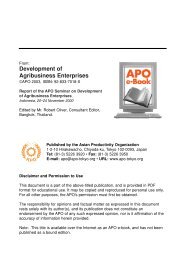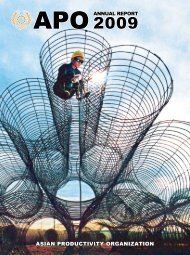Business Potential for Agricultural Biotechnology - Asian Productivity ...
Business Potential for Agricultural Biotechnology - Asian Productivity ...
Business Potential for Agricultural Biotechnology - Asian Productivity ...
You also want an ePaper? Increase the reach of your titles
YUMPU automatically turns print PDFs into web optimized ePapers that Google loves.
Development and Application of Biofertilizers in the Republic of China<br />
Further, Chang and Young (1992b) showed that tea cuttings (cv. TTES No. 12) inoculated with<br />
A-mycorrhiza or P-solubilizing bacteria significantly enhanced the growth of tea seedlings.<br />
Application of Biofertilizers in the Republic of China<br />
In order to promote sustainable agriculture, both central and local government agencies in<br />
the Republic of China are supporting extensive applications of biofertilizers. Major programs <strong>for</strong><br />
the application of biofertilizers include production of rhizobial, P-solubilizing microbial inoculants<br />
<strong>for</strong> soybeans used as vegetables and <strong>for</strong> other crops and the production of AM-inoculants<br />
<strong>for</strong> melons and other horticultural crops. One project also aimed at improving biological nitrogen<br />
fixation in soybeans that are consumed as vegetables, in peanuts, and in red bean. Similarly,<br />
emphasis is also laid on attaining higher yields and better quality horticultural crops through<br />
three major programs: the production of inoculants, extension programs so that farmers can<br />
apply inoculants onto their farms, and demonstrations and awareness programs to show farmers<br />
the benefits of inoculated plots.<br />
Soybeans <strong>for</strong> vegetable purposes are produced extensively in the Republic of China and<br />
exported to Japan. Constant maintenance of superior quality will be an important factor governing<br />
the export value of soybeans in the international market. Earlier, farmers were applying<br />
more chemical fertilizers than the recommended levels, leading to inferior quality in the beans.<br />
The Department of Soil and Environmental Sciences at National Chung Hsing University in the<br />
Republic of China has since 1988 been actively producing and distributing efficient inoculum<br />
(liquid and solid biofertilizers) that can maintain yield and produce superior quality soybeans<br />
which are exported and consumed presently as vegetables in several countries. Figures 1–3 show<br />
the increase in the area of inoculated crops over the past years. During the last 18 years (from<br />
1987 to 2004), inoculants were produced to inoculate approximately 65,091 ha of farmland. In<br />
the same period, farmers’ economic gains have also increased significantly after application of<br />
rhizobial inoculants (USD27 million). Moreover, a great deal of chemical fertilizer was saved,<br />
and further groundwater pollution caused by N leaching was significantly reduced.<br />
Healthy seedlings are one of the essential factors affecting the growth and yield of crops.<br />
Over the past decade, mycorrhizal inoculants have been produced in Taiwan and applied to<br />
many crops, particularly horticultural and ornamental plants such as muskmelon, citrus, strawberry,<br />
lily, tomato, chrysanthemum, gerbera, tea, and fruit trees (Chang 1987, 1993, 1994;<br />
Chang and Young 1992a&b; Cheng and Chung 1991; Chen and Hung 1994; Young 1990).<br />
CONCLUSIONS<br />
An excess of nutrients, particularly P, has accumulated in Taiwan soils as a result of over-<br />
application of chemical fertilizers by farmers during intensive agricultural practices. Hence, a<br />
major research focus should be on the production of efficient and sustainable biofertilizers <strong>for</strong><br />
crop plants so that inorganic fertilizer applications can be reduced significantly to avoid further<br />
pollution problems. With the view of overcoming this bottleneck, it will be necessary to undertake<br />
short-, medium-, and long-term research in which soil microbiologists, agronomists, plant<br />
breeders, plant pathologists, and even nutritionists and economists must work together.<br />
The most important and strategic research initiatives should highlight the following points:<br />
Selection of effective and competitive multifunctional biofertilizers <strong>for</strong> a variety of crops.<br />
Quality control systems <strong>for</strong> the production of inoculants and their application in the field to<br />
explore and ensure the benefits of plant-microbe symbiosis.<br />
Study of microbial persistence of biofertilizers in soil environments under stressful conditions.<br />
Agronomic, soil, and economic evaluation of biofertilizers <strong>for</strong> diverse agricultural production<br />
systems.<br />
– 53 –
















